The Importance of Accounting Regulations on Firm Decision Making
VerifiedAdded on 2023/04/07
|15
|3275
|193
Report
AI Summary
This research report investigates the significance of accounting regulations on the decision-making processes of firms. It synthesizes literature, focusing on the impact of international accounting standards, such as IFRS, on various financial and non-financial parameters. The study examines the positive implications of adopting accounting standards on decision-making, including improvements in transparency, comparability, and investment efficiency. The analysis reviews several journal articles, revealing that accounting regulations influence cost of equity, investment decisions, and hedging strategies. The report highlights the importance of accounting information transparency and its impact on decision-making effectiveness. Overall, the report emphasizes the crucial role of accounting regulations in promoting sound financial reporting and informed decision-making within organizations.
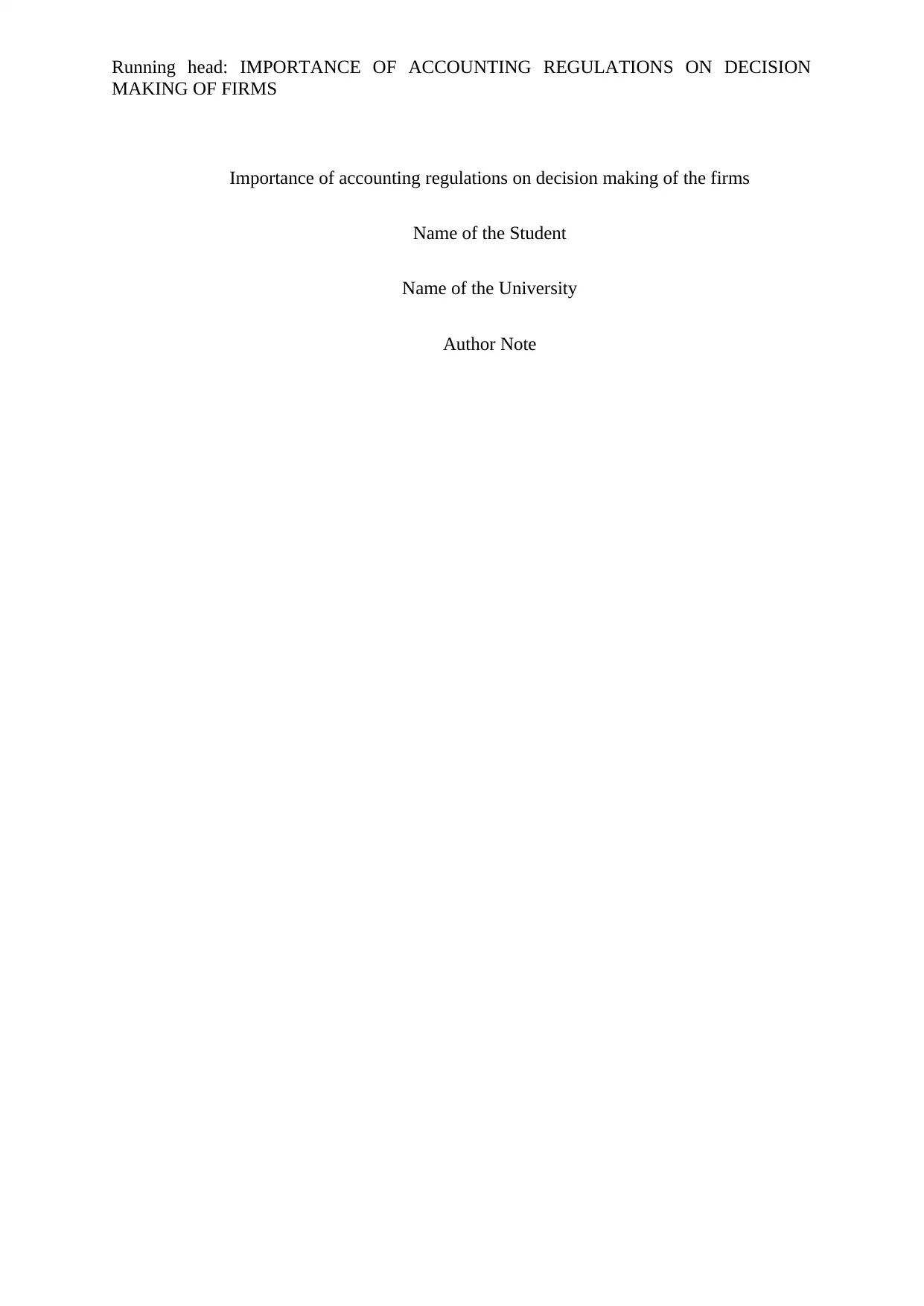
Running head: IMPORTANCE OF ACCOUNTING REGULATIONS ON DECISION
MAKING OF FIRMS
Importance of accounting regulations on decision making of the firms
Name of the Student
Name of the University
Author Note
MAKING OF FIRMS
Importance of accounting regulations on decision making of the firms
Name of the Student
Name of the University
Author Note
Paraphrase This Document
Need a fresh take? Get an instant paraphrase of this document with our AI Paraphraser
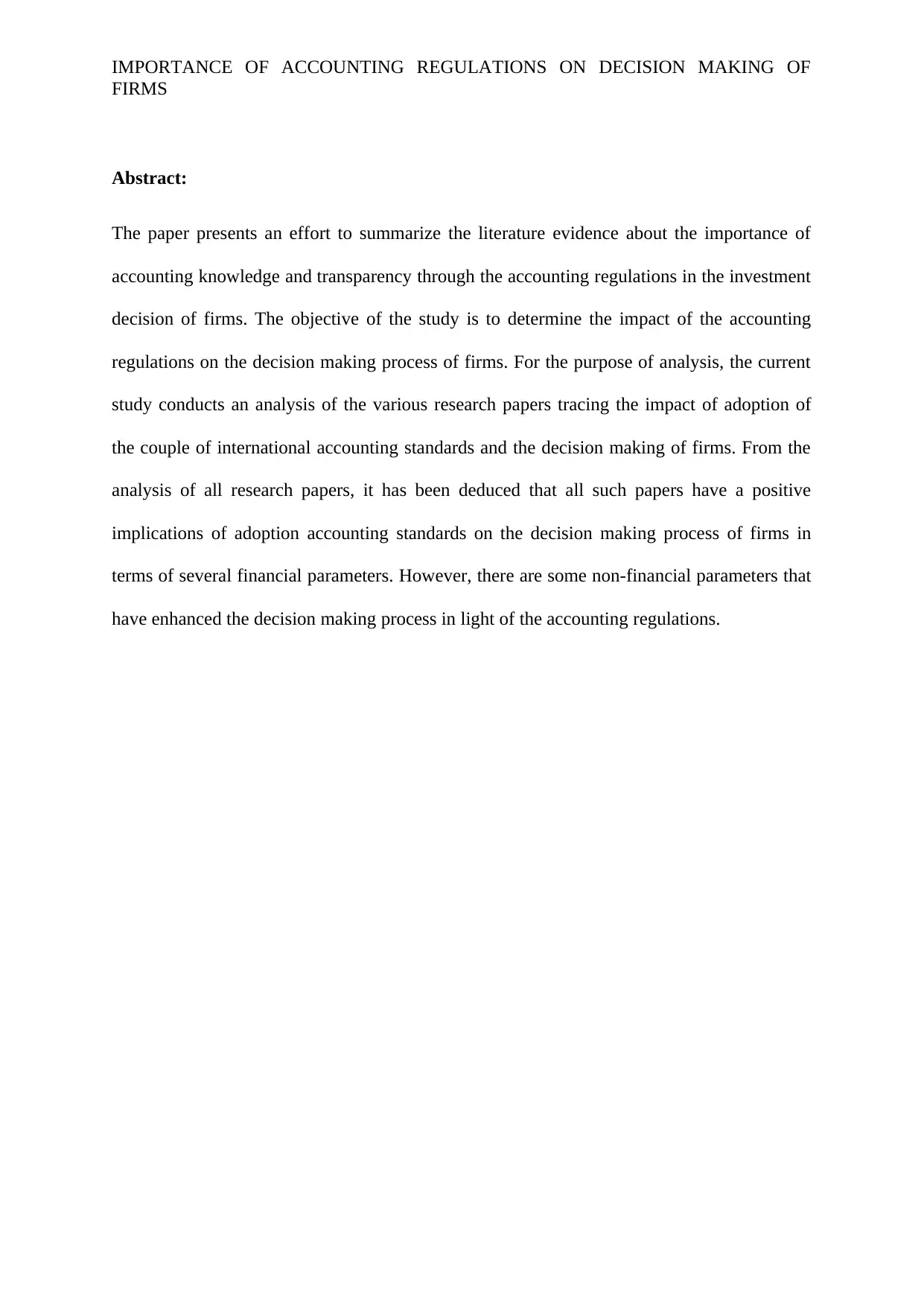
IMPORTANCE OF ACCOUNTING REGULATIONS ON DECISION MAKING OF
FIRMS
Abstract:
The paper presents an effort to summarize the literature evidence about the importance of
accounting knowledge and transparency through the accounting regulations in the investment
decision of firms. The objective of the study is to determine the impact of the accounting
regulations on the decision making process of firms. For the purpose of analysis, the current
study conducts an analysis of the various research papers tracing the impact of adoption of
the couple of international accounting standards and the decision making of firms. From the
analysis of all research papers, it has been deduced that all such papers have a positive
implications of adoption accounting standards on the decision making process of firms in
terms of several financial parameters. However, there are some non-financial parameters that
have enhanced the decision making process in light of the accounting regulations.
FIRMS
Abstract:
The paper presents an effort to summarize the literature evidence about the importance of
accounting knowledge and transparency through the accounting regulations in the investment
decision of firms. The objective of the study is to determine the impact of the accounting
regulations on the decision making process of firms. For the purpose of analysis, the current
study conducts an analysis of the various research papers tracing the impact of adoption of
the couple of international accounting standards and the decision making of firms. From the
analysis of all research papers, it has been deduced that all such papers have a positive
implications of adoption accounting standards on the decision making process of firms in
terms of several financial parameters. However, there are some non-financial parameters that
have enhanced the decision making process in light of the accounting regulations.
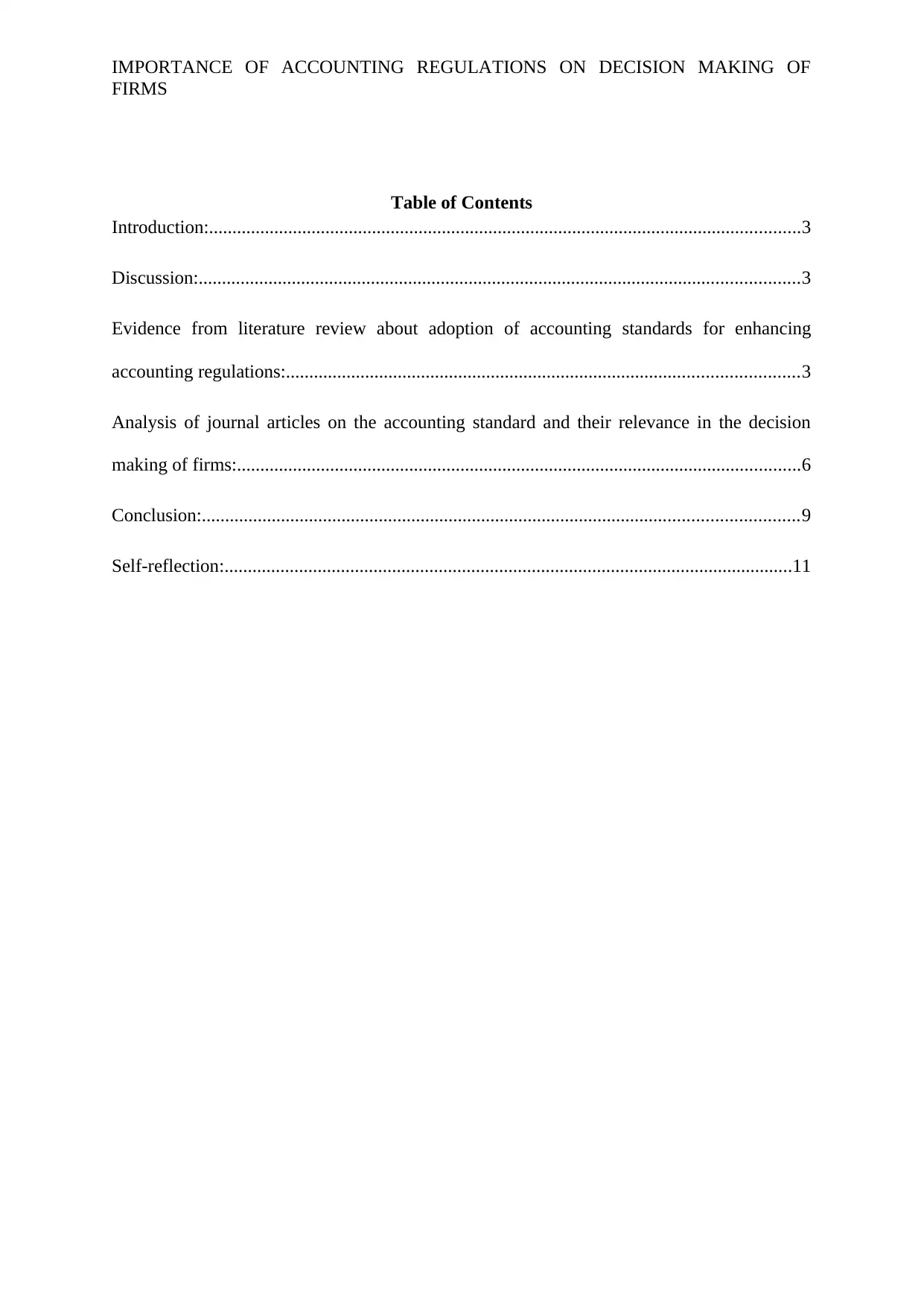
IMPORTANCE OF ACCOUNTING REGULATIONS ON DECISION MAKING OF
FIRMS
Table of Contents
Introduction:...............................................................................................................................3
Discussion:.................................................................................................................................3
Evidence from literature review about adoption of accounting standards for enhancing
accounting regulations:..............................................................................................................3
Analysis of journal articles on the accounting standard and their relevance in the decision
making of firms:.........................................................................................................................6
Conclusion:................................................................................................................................9
Self-reflection:..........................................................................................................................11
FIRMS
Table of Contents
Introduction:...............................................................................................................................3
Discussion:.................................................................................................................................3
Evidence from literature review about adoption of accounting standards for enhancing
accounting regulations:..............................................................................................................3
Analysis of journal articles on the accounting standard and their relevance in the decision
making of firms:.........................................................................................................................6
Conclusion:................................................................................................................................9
Self-reflection:..........................................................................................................................11
⊘ This is a preview!⊘
Do you want full access?
Subscribe today to unlock all pages.

Trusted by 1+ million students worldwide
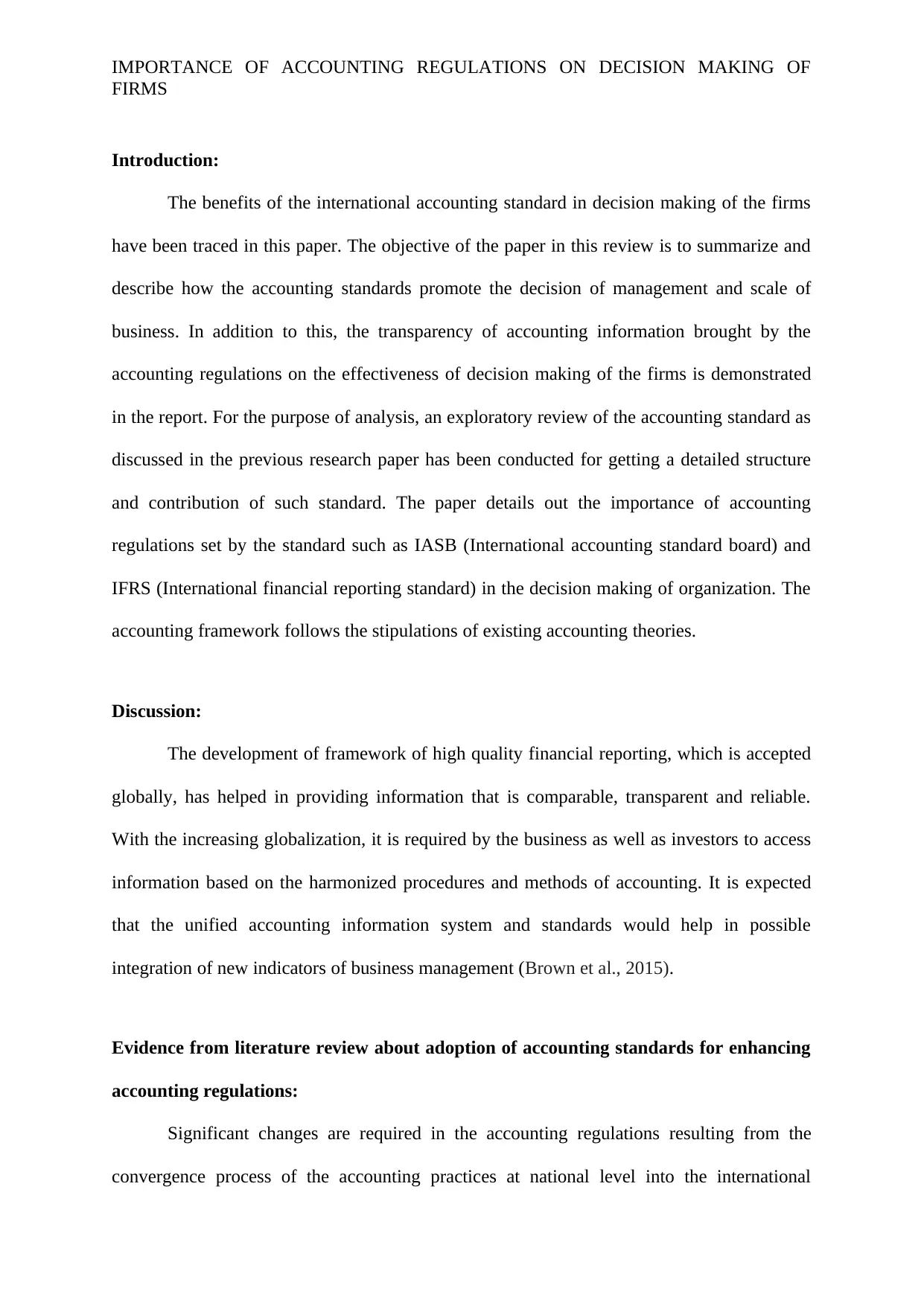
IMPORTANCE OF ACCOUNTING REGULATIONS ON DECISION MAKING OF
FIRMS
Introduction:
The benefits of the international accounting standard in decision making of the firms
have been traced in this paper. The objective of the paper in this review is to summarize and
describe how the accounting standards promote the decision of management and scale of
business. In addition to this, the transparency of accounting information brought by the
accounting regulations on the effectiveness of decision making of the firms is demonstrated
in the report. For the purpose of analysis, an exploratory review of the accounting standard as
discussed in the previous research paper has been conducted for getting a detailed structure
and contribution of such standard. The paper details out the importance of accounting
regulations set by the standard such as IASB (International accounting standard board) and
IFRS (International financial reporting standard) in the decision making of organization. The
accounting framework follows the stipulations of existing accounting theories.
Discussion:
The development of framework of high quality financial reporting, which is accepted
globally, has helped in providing information that is comparable, transparent and reliable.
With the increasing globalization, it is required by the business as well as investors to access
information based on the harmonized procedures and methods of accounting. It is expected
that the unified accounting information system and standards would help in possible
integration of new indicators of business management (Brown et al., 2015).
Evidence from literature review about adoption of accounting standards for enhancing
accounting regulations:
Significant changes are required in the accounting regulations resulting from the
convergence process of the accounting practices at national level into the international
FIRMS
Introduction:
The benefits of the international accounting standard in decision making of the firms
have been traced in this paper. The objective of the paper in this review is to summarize and
describe how the accounting standards promote the decision of management and scale of
business. In addition to this, the transparency of accounting information brought by the
accounting regulations on the effectiveness of decision making of the firms is demonstrated
in the report. For the purpose of analysis, an exploratory review of the accounting standard as
discussed in the previous research paper has been conducted for getting a detailed structure
and contribution of such standard. The paper details out the importance of accounting
regulations set by the standard such as IASB (International accounting standard board) and
IFRS (International financial reporting standard) in the decision making of organization. The
accounting framework follows the stipulations of existing accounting theories.
Discussion:
The development of framework of high quality financial reporting, which is accepted
globally, has helped in providing information that is comparable, transparent and reliable.
With the increasing globalization, it is required by the business as well as investors to access
information based on the harmonized procedures and methods of accounting. It is expected
that the unified accounting information system and standards would help in possible
integration of new indicators of business management (Brown et al., 2015).
Evidence from literature review about adoption of accounting standards for enhancing
accounting regulations:
Significant changes are required in the accounting regulations resulting from the
convergence process of the accounting practices at national level into the international
Paraphrase This Document
Need a fresh take? Get an instant paraphrase of this document with our AI Paraphraser
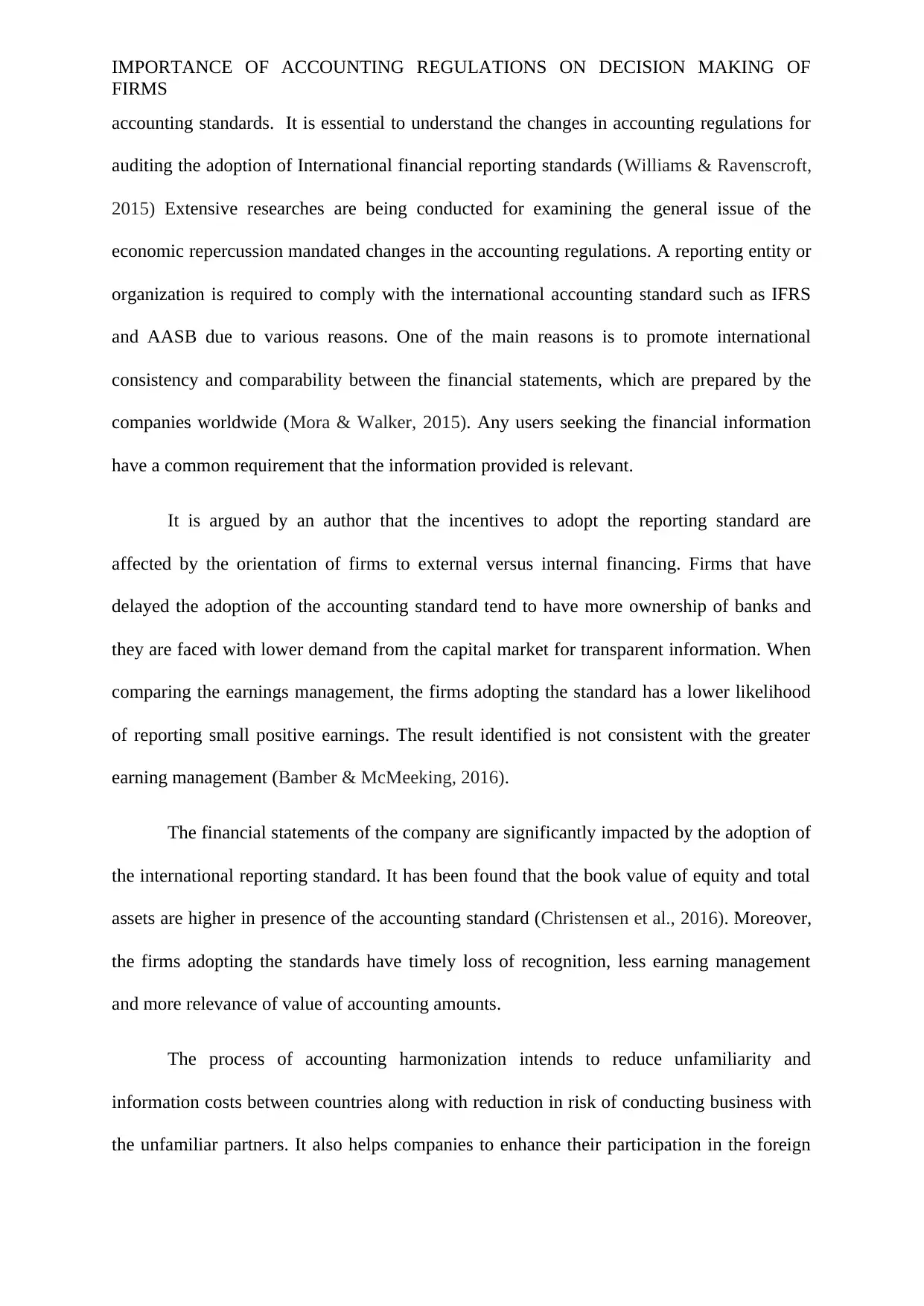
IMPORTANCE OF ACCOUNTING REGULATIONS ON DECISION MAKING OF
FIRMS
accounting standards. It is essential to understand the changes in accounting regulations for
auditing the adoption of International financial reporting standards (Williams & Ravenscroft,
2015) Extensive researches are being conducted for examining the general issue of the
economic repercussion mandated changes in the accounting regulations. A reporting entity or
organization is required to comply with the international accounting standard such as IFRS
and AASB due to various reasons. One of the main reasons is to promote international
consistency and comparability between the financial statements, which are prepared by the
companies worldwide (Mora & Walker, 2015). Any users seeking the financial information
have a common requirement that the information provided is relevant.
It is argued by an author that the incentives to adopt the reporting standard are
affected by the orientation of firms to external versus internal financing. Firms that have
delayed the adoption of the accounting standard tend to have more ownership of banks and
they are faced with lower demand from the capital market for transparent information. When
comparing the earnings management, the firms adopting the standard has a lower likelihood
of reporting small positive earnings. The result identified is not consistent with the greater
earning management (Bamber & McMeeking, 2016).
The financial statements of the company are significantly impacted by the adoption of
the international reporting standard. It has been found that the book value of equity and total
assets are higher in presence of the accounting standard (Christensen et al., 2016). Moreover,
the firms adopting the standards have timely loss of recognition, less earning management
and more relevance of value of accounting amounts.
The process of accounting harmonization intends to reduce unfamiliarity and
information costs between countries along with reduction in risk of conducting business with
the unfamiliar partners. It also helps companies to enhance their participation in the foreign
FIRMS
accounting standards. It is essential to understand the changes in accounting regulations for
auditing the adoption of International financial reporting standards (Williams & Ravenscroft,
2015) Extensive researches are being conducted for examining the general issue of the
economic repercussion mandated changes in the accounting regulations. A reporting entity or
organization is required to comply with the international accounting standard such as IFRS
and AASB due to various reasons. One of the main reasons is to promote international
consistency and comparability between the financial statements, which are prepared by the
companies worldwide (Mora & Walker, 2015). Any users seeking the financial information
have a common requirement that the information provided is relevant.
It is argued by an author that the incentives to adopt the reporting standard are
affected by the orientation of firms to external versus internal financing. Firms that have
delayed the adoption of the accounting standard tend to have more ownership of banks and
they are faced with lower demand from the capital market for transparent information. When
comparing the earnings management, the firms adopting the standard has a lower likelihood
of reporting small positive earnings. The result identified is not consistent with the greater
earning management (Bamber & McMeeking, 2016).
The financial statements of the company are significantly impacted by the adoption of
the international reporting standard. It has been found that the book value of equity and total
assets are higher in presence of the accounting standard (Christensen et al., 2016). Moreover,
the firms adopting the standards have timely loss of recognition, less earning management
and more relevance of value of accounting amounts.
The process of accounting harmonization intends to reduce unfamiliarity and
information costs between countries along with reduction in risk of conducting business with
the unfamiliar partners. It also helps companies to enhance their participation in the foreign
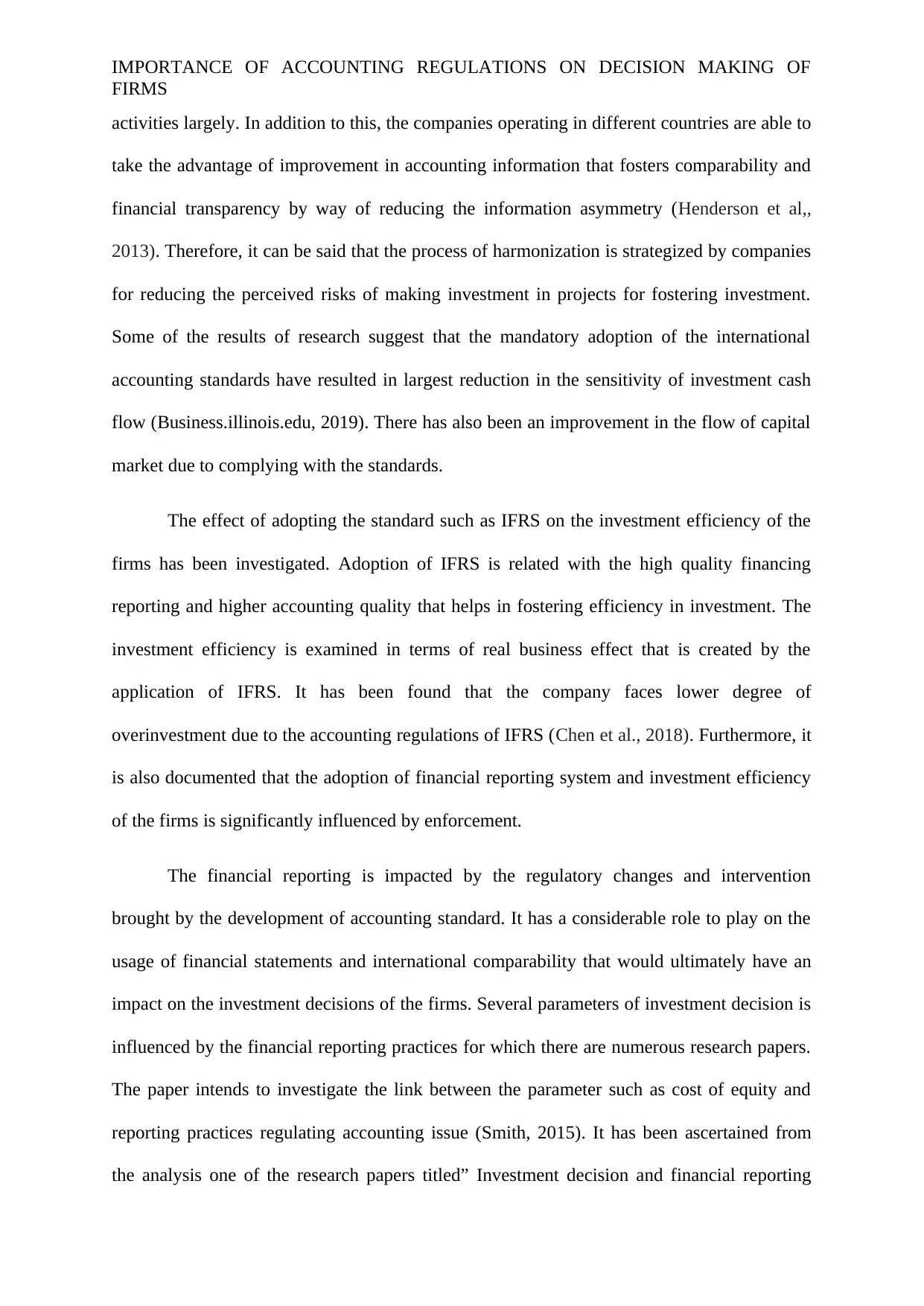
IMPORTANCE OF ACCOUNTING REGULATIONS ON DECISION MAKING OF
FIRMS
activities largely. In addition to this, the companies operating in different countries are able to
take the advantage of improvement in accounting information that fosters comparability and
financial transparency by way of reducing the information asymmetry (Henderson et al,,
2013). Therefore, it can be said that the process of harmonization is strategized by companies
for reducing the perceived risks of making investment in projects for fostering investment.
Some of the results of research suggest that the mandatory adoption of the international
accounting standards have resulted in largest reduction in the sensitivity of investment cash
flow (Business.illinois.edu, 2019). There has also been an improvement in the flow of capital
market due to complying with the standards.
The effect of adopting the standard such as IFRS on the investment efficiency of the
firms has been investigated. Adoption of IFRS is related with the high quality financing
reporting and higher accounting quality that helps in fostering efficiency in investment. The
investment efficiency is examined in terms of real business effect that is created by the
application of IFRS. It has been found that the company faces lower degree of
overinvestment due to the accounting regulations of IFRS (Chen et al., 2018). Furthermore, it
is also documented that the adoption of financial reporting system and investment efficiency
of the firms is significantly influenced by enforcement.
The financial reporting is impacted by the regulatory changes and intervention
brought by the development of accounting standard. It has a considerable role to play on the
usage of financial statements and international comparability that would ultimately have an
impact on the investment decisions of the firms. Several parameters of investment decision is
influenced by the financial reporting practices for which there are numerous research papers.
The paper intends to investigate the link between the parameter such as cost of equity and
reporting practices regulating accounting issue (Smith, 2015). It has been ascertained from
the analysis one of the research papers titled” Investment decision and financial reporting
FIRMS
activities largely. In addition to this, the companies operating in different countries are able to
take the advantage of improvement in accounting information that fosters comparability and
financial transparency by way of reducing the information asymmetry (Henderson et al,,
2013). Therefore, it can be said that the process of harmonization is strategized by companies
for reducing the perceived risks of making investment in projects for fostering investment.
Some of the results of research suggest that the mandatory adoption of the international
accounting standards have resulted in largest reduction in the sensitivity of investment cash
flow (Business.illinois.edu, 2019). There has also been an improvement in the flow of capital
market due to complying with the standards.
The effect of adopting the standard such as IFRS on the investment efficiency of the
firms has been investigated. Adoption of IFRS is related with the high quality financing
reporting and higher accounting quality that helps in fostering efficiency in investment. The
investment efficiency is examined in terms of real business effect that is created by the
application of IFRS. It has been found that the company faces lower degree of
overinvestment due to the accounting regulations of IFRS (Chen et al., 2018). Furthermore, it
is also documented that the adoption of financial reporting system and investment efficiency
of the firms is significantly influenced by enforcement.
The financial reporting is impacted by the regulatory changes and intervention
brought by the development of accounting standard. It has a considerable role to play on the
usage of financial statements and international comparability that would ultimately have an
impact on the investment decisions of the firms. Several parameters of investment decision is
influenced by the financial reporting practices for which there are numerous research papers.
The paper intends to investigate the link between the parameter such as cost of equity and
reporting practices regulating accounting issue (Smith, 2015). It has been ascertained from
the analysis one of the research papers titled” Investment decision and financial reporting
⊘ This is a preview!⊘
Do you want full access?
Subscribe today to unlock all pages.

Trusted by 1+ million students worldwide
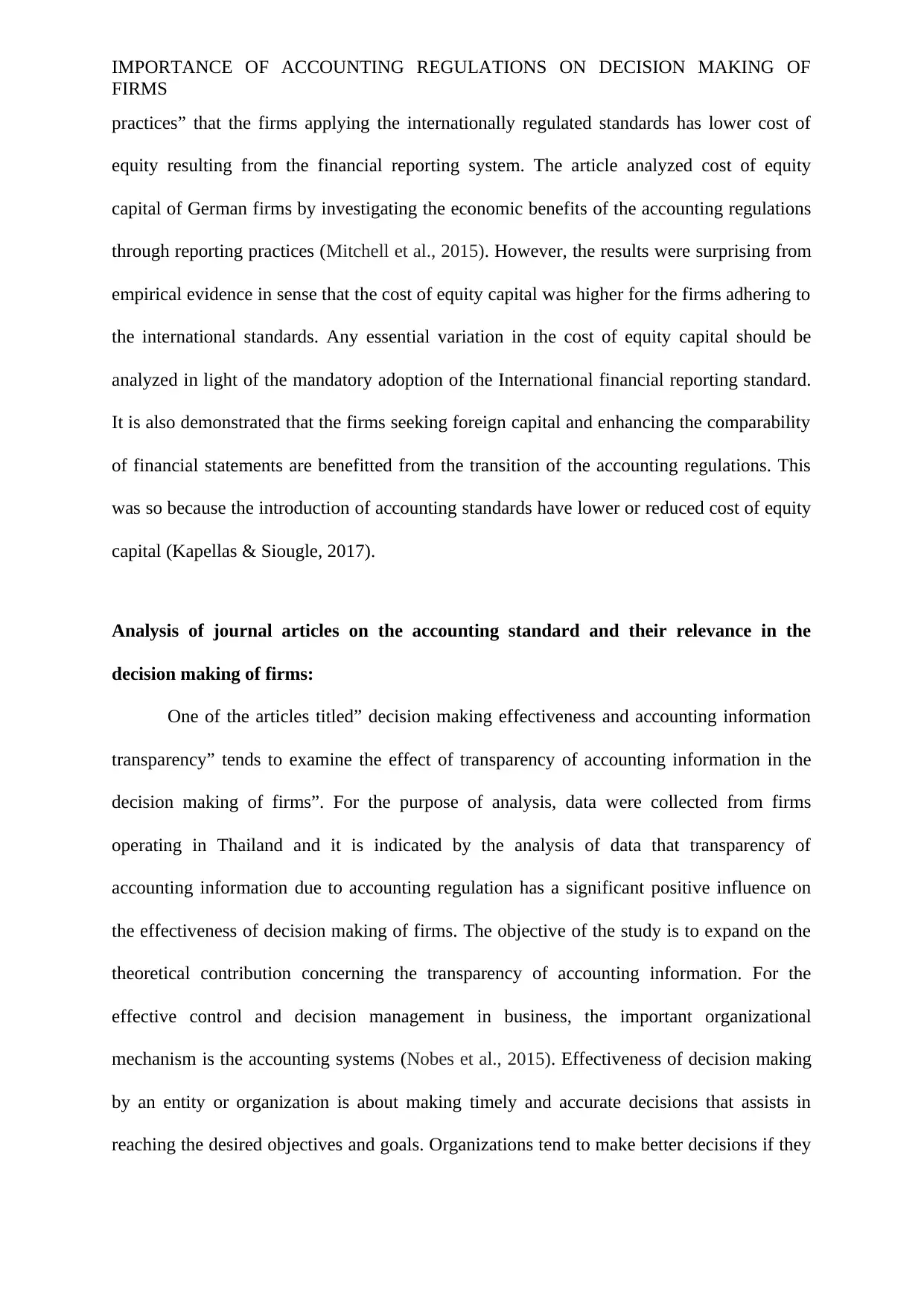
IMPORTANCE OF ACCOUNTING REGULATIONS ON DECISION MAKING OF
FIRMS
practices” that the firms applying the internationally regulated standards has lower cost of
equity resulting from the financial reporting system. The article analyzed cost of equity
capital of German firms by investigating the economic benefits of the accounting regulations
through reporting practices (Mitchell et al., 2015). However, the results were surprising from
empirical evidence in sense that the cost of equity capital was higher for the firms adhering to
the international standards. Any essential variation in the cost of equity capital should be
analyzed in light of the mandatory adoption of the International financial reporting standard.
It is also demonstrated that the firms seeking foreign capital and enhancing the comparability
of financial statements are benefitted from the transition of the accounting regulations. This
was so because the introduction of accounting standards have lower or reduced cost of equity
capital (Kapellas & Siougle, 2017).
Analysis of journal articles on the accounting standard and their relevance in the
decision making of firms:
One of the articles titled” decision making effectiveness and accounting information
transparency” tends to examine the effect of transparency of accounting information in the
decision making of firms”. For the purpose of analysis, data were collected from firms
operating in Thailand and it is indicated by the analysis of data that transparency of
accounting information due to accounting regulation has a significant positive influence on
the effectiveness of decision making of firms. The objective of the study is to expand on the
theoretical contribution concerning the transparency of accounting information. For the
effective control and decision management in business, the important organizational
mechanism is the accounting systems (Nobes et al., 2015). Effectiveness of decision making
by an entity or organization is about making timely and accurate decisions that assists in
reaching the desired objectives and goals. Organizations tend to make better decisions if they
FIRMS
practices” that the firms applying the internationally regulated standards has lower cost of
equity resulting from the financial reporting system. The article analyzed cost of equity
capital of German firms by investigating the economic benefits of the accounting regulations
through reporting practices (Mitchell et al., 2015). However, the results were surprising from
empirical evidence in sense that the cost of equity capital was higher for the firms adhering to
the international standards. Any essential variation in the cost of equity capital should be
analyzed in light of the mandatory adoption of the International financial reporting standard.
It is also demonstrated that the firms seeking foreign capital and enhancing the comparability
of financial statements are benefitted from the transition of the accounting regulations. This
was so because the introduction of accounting standards have lower or reduced cost of equity
capital (Kapellas & Siougle, 2017).
Analysis of journal articles on the accounting standard and their relevance in the
decision making of firms:
One of the articles titled” decision making effectiveness and accounting information
transparency” tends to examine the effect of transparency of accounting information in the
decision making of firms”. For the purpose of analysis, data were collected from firms
operating in Thailand and it is indicated by the analysis of data that transparency of
accounting information due to accounting regulation has a significant positive influence on
the effectiveness of decision making of firms. The objective of the study is to expand on the
theoretical contribution concerning the transparency of accounting information. For the
effective control and decision management in business, the important organizational
mechanism is the accounting systems (Nobes et al., 2015). Effectiveness of decision making
by an entity or organization is about making timely and accurate decisions that assists in
reaching the desired objectives and goals. Organizations tend to make better decisions if they
Paraphrase This Document
Need a fresh take? Get an instant paraphrase of this document with our AI Paraphraser
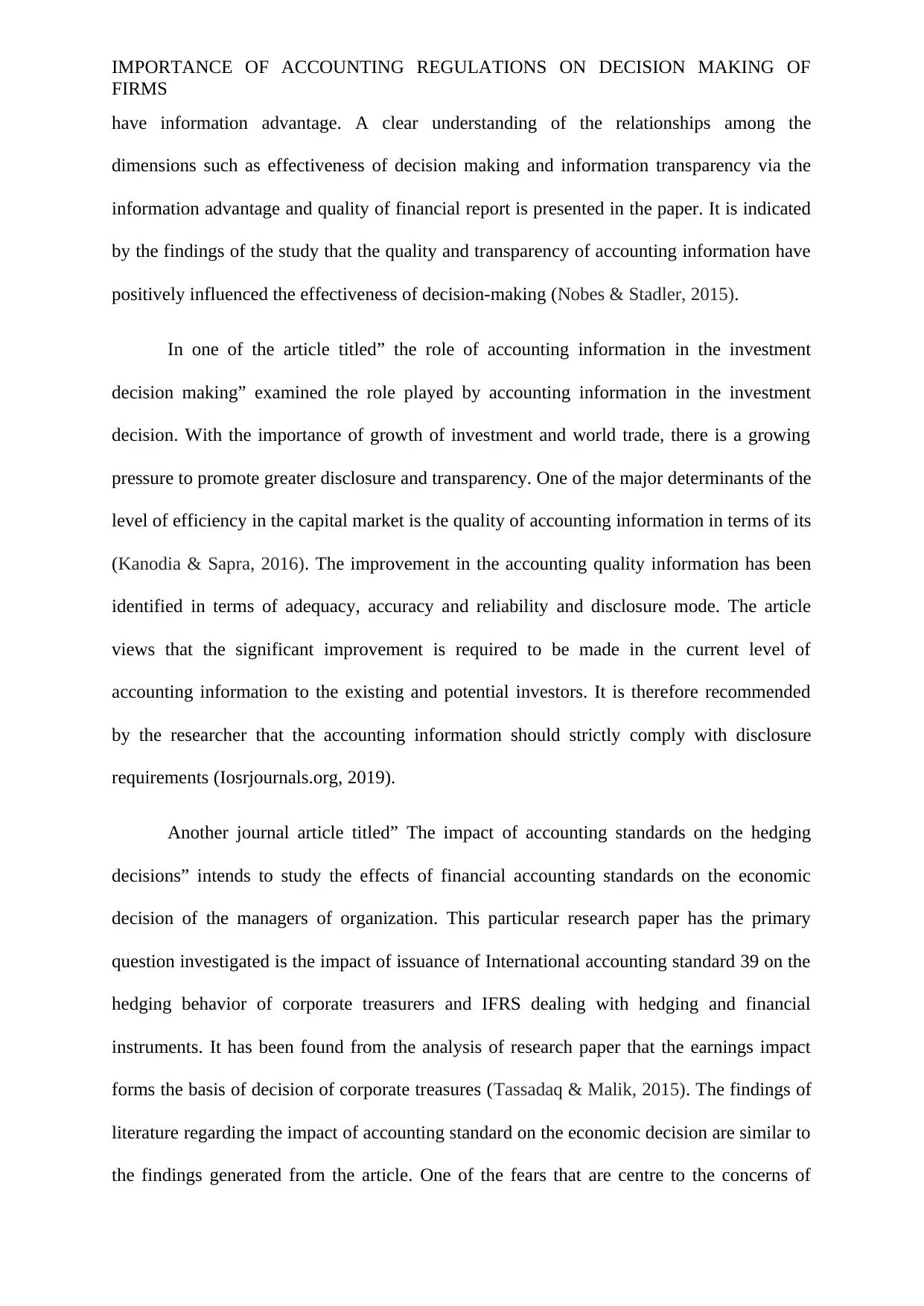
IMPORTANCE OF ACCOUNTING REGULATIONS ON DECISION MAKING OF
FIRMS
have information advantage. A clear understanding of the relationships among the
dimensions such as effectiveness of decision making and information transparency via the
information advantage and quality of financial report is presented in the paper. It is indicated
by the findings of the study that the quality and transparency of accounting information have
positively influenced the effectiveness of decision-making (Nobes & Stadler, 2015).
In one of the article titled” the role of accounting information in the investment
decision making” examined the role played by accounting information in the investment
decision. With the importance of growth of investment and world trade, there is a growing
pressure to promote greater disclosure and transparency. One of the major determinants of the
level of efficiency in the capital market is the quality of accounting information in terms of its
(Kanodia & Sapra, 2016). The improvement in the accounting quality information has been
identified in terms of adequacy, accuracy and reliability and disclosure mode. The article
views that the significant improvement is required to be made in the current level of
accounting information to the existing and potential investors. It is therefore recommended
by the researcher that the accounting information should strictly comply with disclosure
requirements (Iosrjournals.org, 2019).
Another journal article titled” The impact of accounting standards on the hedging
decisions” intends to study the effects of financial accounting standards on the economic
decision of the managers of organization. This particular research paper has the primary
question investigated is the impact of issuance of International accounting standard 39 on the
hedging behavior of corporate treasurers and IFRS dealing with hedging and financial
instruments. It has been found from the analysis of research paper that the earnings impact
forms the basis of decision of corporate treasures (Tassadaq & Malik, 2015). The findings of
literature regarding the impact of accounting standard on the economic decision are similar to
the findings generated from the article. One of the fears that are centre to the concerns of
FIRMS
have information advantage. A clear understanding of the relationships among the
dimensions such as effectiveness of decision making and information transparency via the
information advantage and quality of financial report is presented in the paper. It is indicated
by the findings of the study that the quality and transparency of accounting information have
positively influenced the effectiveness of decision-making (Nobes & Stadler, 2015).
In one of the article titled” the role of accounting information in the investment
decision making” examined the role played by accounting information in the investment
decision. With the importance of growth of investment and world trade, there is a growing
pressure to promote greater disclosure and transparency. One of the major determinants of the
level of efficiency in the capital market is the quality of accounting information in terms of its
(Kanodia & Sapra, 2016). The improvement in the accounting quality information has been
identified in terms of adequacy, accuracy and reliability and disclosure mode. The article
views that the significant improvement is required to be made in the current level of
accounting information to the existing and potential investors. It is therefore recommended
by the researcher that the accounting information should strictly comply with disclosure
requirements (Iosrjournals.org, 2019).
Another journal article titled” The impact of accounting standards on the hedging
decisions” intends to study the effects of financial accounting standards on the economic
decision of the managers of organization. This particular research paper has the primary
question investigated is the impact of issuance of International accounting standard 39 on the
hedging behavior of corporate treasurers and IFRS dealing with hedging and financial
instruments. It has been found from the analysis of research paper that the earnings impact
forms the basis of decision of corporate treasures (Tassadaq & Malik, 2015). The findings of
literature regarding the impact of accounting standard on the economic decision are similar to
the findings generated from the article. One of the fears that are centre to the concerns of
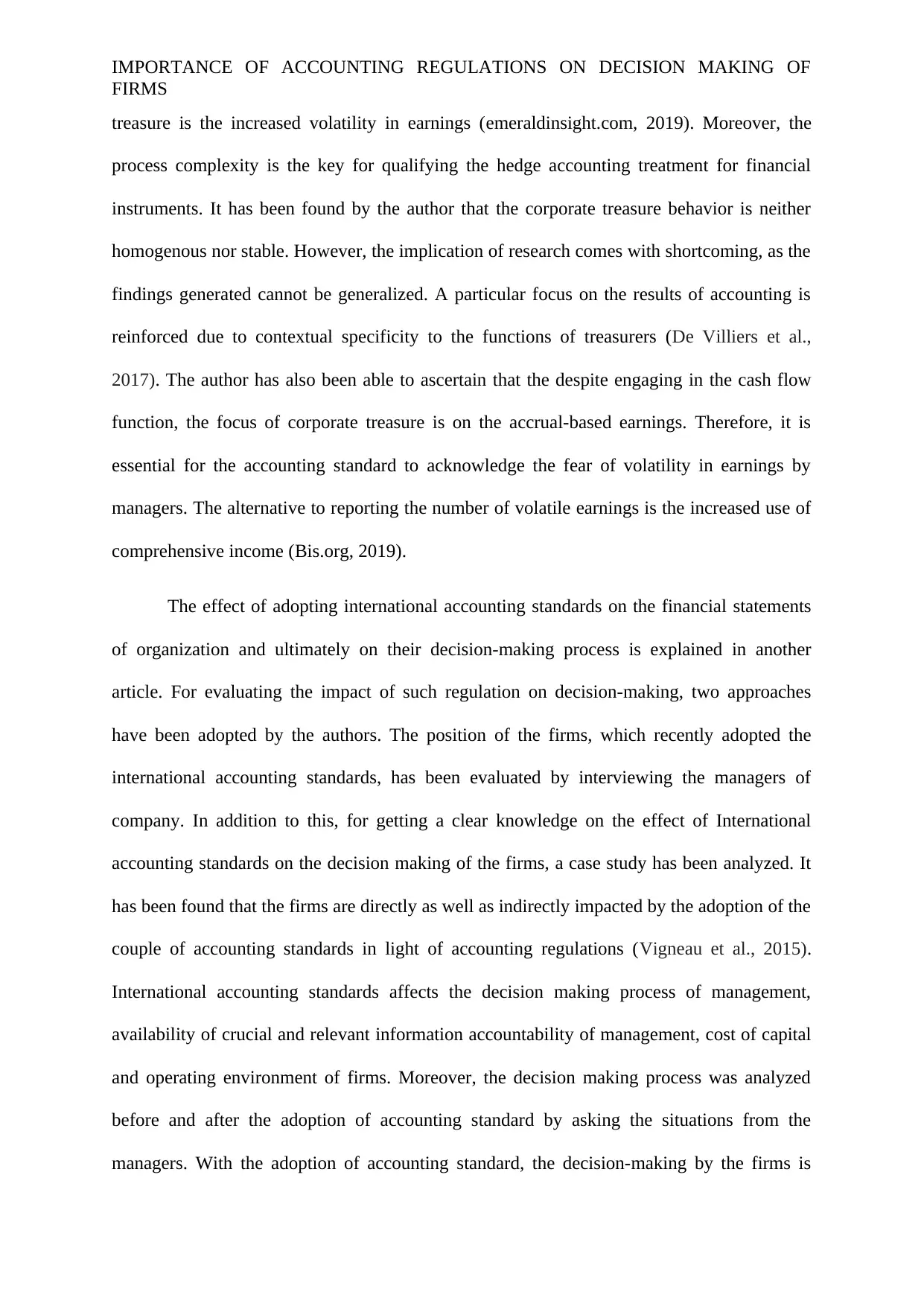
IMPORTANCE OF ACCOUNTING REGULATIONS ON DECISION MAKING OF
FIRMS
treasure is the increased volatility in earnings (emeraldinsight.com, 2019). Moreover, the
process complexity is the key for qualifying the hedge accounting treatment for financial
instruments. It has been found by the author that the corporate treasure behavior is neither
homogenous nor stable. However, the implication of research comes with shortcoming, as the
findings generated cannot be generalized. A particular focus on the results of accounting is
reinforced due to contextual specificity to the functions of treasurers (De Villiers et al.,
2017). The author has also been able to ascertain that the despite engaging in the cash flow
function, the focus of corporate treasure is on the accrual-based earnings. Therefore, it is
essential for the accounting standard to acknowledge the fear of volatility in earnings by
managers. The alternative to reporting the number of volatile earnings is the increased use of
comprehensive income (Bis.org, 2019).
The effect of adopting international accounting standards on the financial statements
of organization and ultimately on their decision-making process is explained in another
article. For evaluating the impact of such regulation on decision-making, two approaches
have been adopted by the authors. The position of the firms, which recently adopted the
international accounting standards, has been evaluated by interviewing the managers of
company. In addition to this, for getting a clear knowledge on the effect of International
accounting standards on the decision making of the firms, a case study has been analyzed. It
has been found that the firms are directly as well as indirectly impacted by the adoption of the
couple of accounting standards in light of accounting regulations (Vigneau et al., 2015).
International accounting standards affects the decision making process of management,
availability of crucial and relevant information accountability of management, cost of capital
and operating environment of firms. Moreover, the decision making process was analyzed
before and after the adoption of accounting standard by asking the situations from the
managers. With the adoption of accounting standard, the decision-making by the firms is
FIRMS
treasure is the increased volatility in earnings (emeraldinsight.com, 2019). Moreover, the
process complexity is the key for qualifying the hedge accounting treatment for financial
instruments. It has been found by the author that the corporate treasure behavior is neither
homogenous nor stable. However, the implication of research comes with shortcoming, as the
findings generated cannot be generalized. A particular focus on the results of accounting is
reinforced due to contextual specificity to the functions of treasurers (De Villiers et al.,
2017). The author has also been able to ascertain that the despite engaging in the cash flow
function, the focus of corporate treasure is on the accrual-based earnings. Therefore, it is
essential for the accounting standard to acknowledge the fear of volatility in earnings by
managers. The alternative to reporting the number of volatile earnings is the increased use of
comprehensive income (Bis.org, 2019).
The effect of adopting international accounting standards on the financial statements
of organization and ultimately on their decision-making process is explained in another
article. For evaluating the impact of such regulation on decision-making, two approaches
have been adopted by the authors. The position of the firms, which recently adopted the
international accounting standards, has been evaluated by interviewing the managers of
company. In addition to this, for getting a clear knowledge on the effect of International
accounting standards on the decision making of the firms, a case study has been analyzed. It
has been found that the firms are directly as well as indirectly impacted by the adoption of the
couple of accounting standards in light of accounting regulations (Vigneau et al., 2015).
International accounting standards affects the decision making process of management,
availability of crucial and relevant information accountability of management, cost of capital
and operating environment of firms. Moreover, the decision making process was analyzed
before and after the adoption of accounting standard by asking the situations from the
managers. With the adoption of accounting standard, the decision-making by the firms is
⊘ This is a preview!⊘
Do you want full access?
Subscribe today to unlock all pages.

Trusted by 1+ million students worldwide
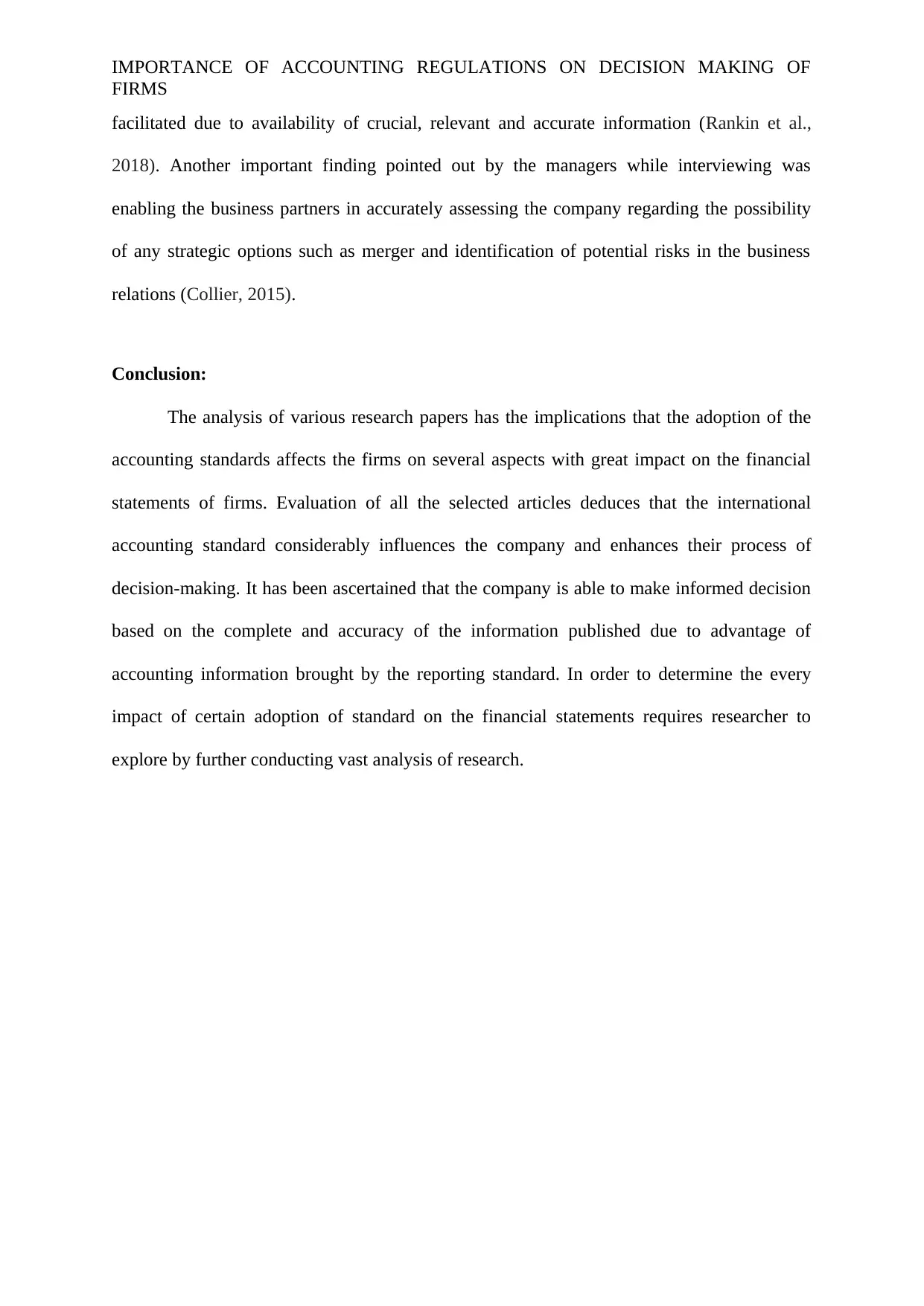
IMPORTANCE OF ACCOUNTING REGULATIONS ON DECISION MAKING OF
FIRMS
facilitated due to availability of crucial, relevant and accurate information (Rankin et al.,
2018). Another important finding pointed out by the managers while interviewing was
enabling the business partners in accurately assessing the company regarding the possibility
of any strategic options such as merger and identification of potential risks in the business
relations (Collier, 2015).
Conclusion:
The analysis of various research papers has the implications that the adoption of the
accounting standards affects the firms on several aspects with great impact on the financial
statements of firms. Evaluation of all the selected articles deduces that the international
accounting standard considerably influences the company and enhances their process of
decision-making. It has been ascertained that the company is able to make informed decision
based on the complete and accuracy of the information published due to advantage of
accounting information brought by the reporting standard. In order to determine the every
impact of certain adoption of standard on the financial statements requires researcher to
explore by further conducting vast analysis of research.
FIRMS
facilitated due to availability of crucial, relevant and accurate information (Rankin et al.,
2018). Another important finding pointed out by the managers while interviewing was
enabling the business partners in accurately assessing the company regarding the possibility
of any strategic options such as merger and identification of potential risks in the business
relations (Collier, 2015).
Conclusion:
The analysis of various research papers has the implications that the adoption of the
accounting standards affects the firms on several aspects with great impact on the financial
statements of firms. Evaluation of all the selected articles deduces that the international
accounting standard considerably influences the company and enhances their process of
decision-making. It has been ascertained that the company is able to make informed decision
based on the complete and accuracy of the information published due to advantage of
accounting information brought by the reporting standard. In order to determine the every
impact of certain adoption of standard on the financial statements requires researcher to
explore by further conducting vast analysis of research.
Paraphrase This Document
Need a fresh take? Get an instant paraphrase of this document with our AI Paraphraser
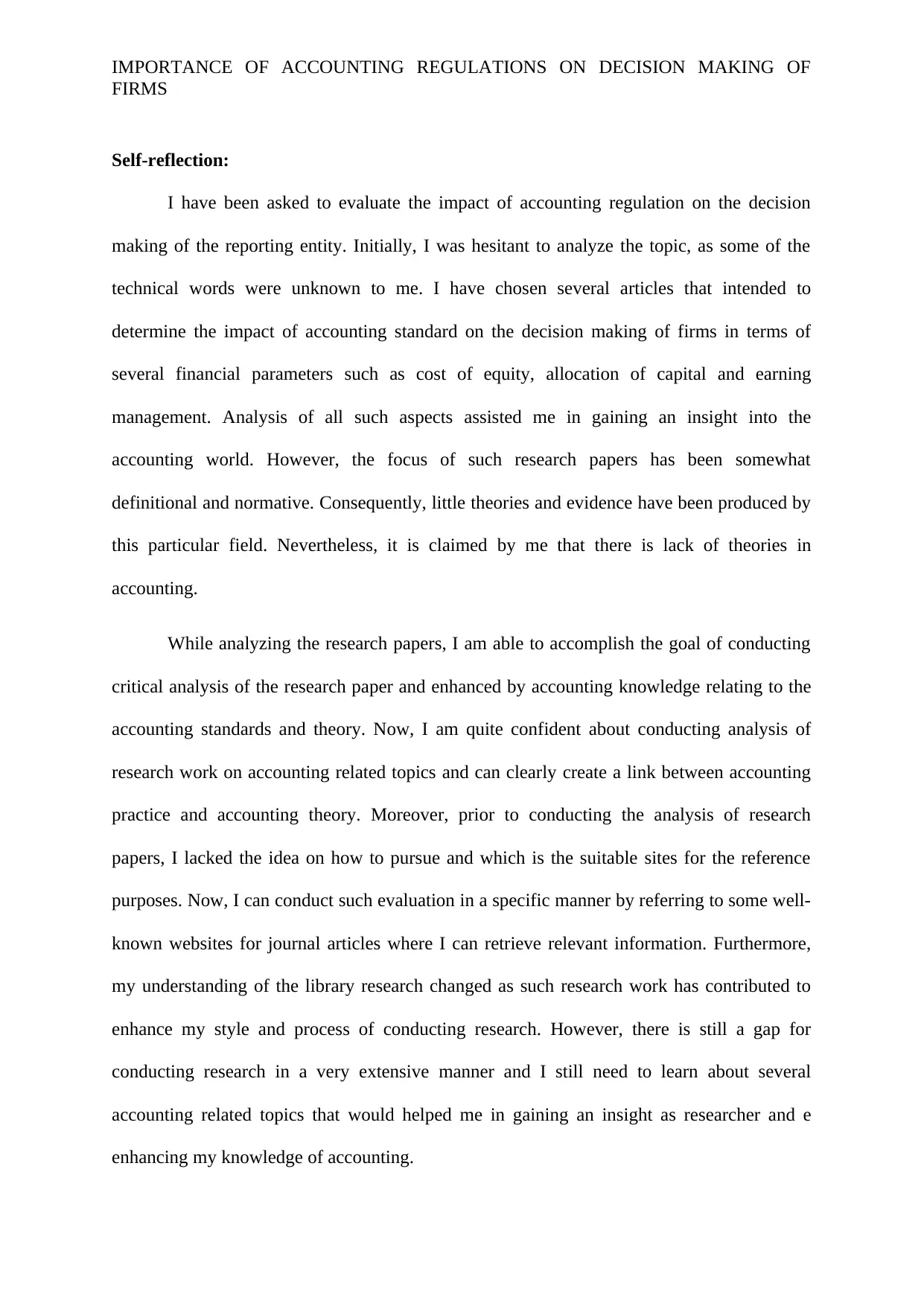
IMPORTANCE OF ACCOUNTING REGULATIONS ON DECISION MAKING OF
FIRMS
Self-reflection:
I have been asked to evaluate the impact of accounting regulation on the decision
making of the reporting entity. Initially, I was hesitant to analyze the topic, as some of the
technical words were unknown to me. I have chosen several articles that intended to
determine the impact of accounting standard on the decision making of firms in terms of
several financial parameters such as cost of equity, allocation of capital and earning
management. Analysis of all such aspects assisted me in gaining an insight into the
accounting world. However, the focus of such research papers has been somewhat
definitional and normative. Consequently, little theories and evidence have been produced by
this particular field. Nevertheless, it is claimed by me that there is lack of theories in
accounting.
While analyzing the research papers, I am able to accomplish the goal of conducting
critical analysis of the research paper and enhanced by accounting knowledge relating to the
accounting standards and theory. Now, I am quite confident about conducting analysis of
research work on accounting related topics and can clearly create a link between accounting
practice and accounting theory. Moreover, prior to conducting the analysis of research
papers, I lacked the idea on how to pursue and which is the suitable sites for the reference
purposes. Now, I can conduct such evaluation in a specific manner by referring to some well-
known websites for journal articles where I can retrieve relevant information. Furthermore,
my understanding of the library research changed as such research work has contributed to
enhance my style and process of conducting research. However, there is still a gap for
conducting research in a very extensive manner and I still need to learn about several
accounting related topics that would helped me in gaining an insight as researcher and e
enhancing my knowledge of accounting.
FIRMS
Self-reflection:
I have been asked to evaluate the impact of accounting regulation on the decision
making of the reporting entity. Initially, I was hesitant to analyze the topic, as some of the
technical words were unknown to me. I have chosen several articles that intended to
determine the impact of accounting standard on the decision making of firms in terms of
several financial parameters such as cost of equity, allocation of capital and earning
management. Analysis of all such aspects assisted me in gaining an insight into the
accounting world. However, the focus of such research papers has been somewhat
definitional and normative. Consequently, little theories and evidence have been produced by
this particular field. Nevertheless, it is claimed by me that there is lack of theories in
accounting.
While analyzing the research papers, I am able to accomplish the goal of conducting
critical analysis of the research paper and enhanced by accounting knowledge relating to the
accounting standards and theory. Now, I am quite confident about conducting analysis of
research work on accounting related topics and can clearly create a link between accounting
practice and accounting theory. Moreover, prior to conducting the analysis of research
papers, I lacked the idea on how to pursue and which is the suitable sites for the reference
purposes. Now, I can conduct such evaluation in a specific manner by referring to some well-
known websites for journal articles where I can retrieve relevant information. Furthermore,
my understanding of the library research changed as such research work has contributed to
enhance my style and process of conducting research. However, there is still a gap for
conducting research in a very extensive manner and I still need to learn about several
accounting related topics that would helped me in gaining an insight as researcher and e
enhancing my knowledge of accounting.
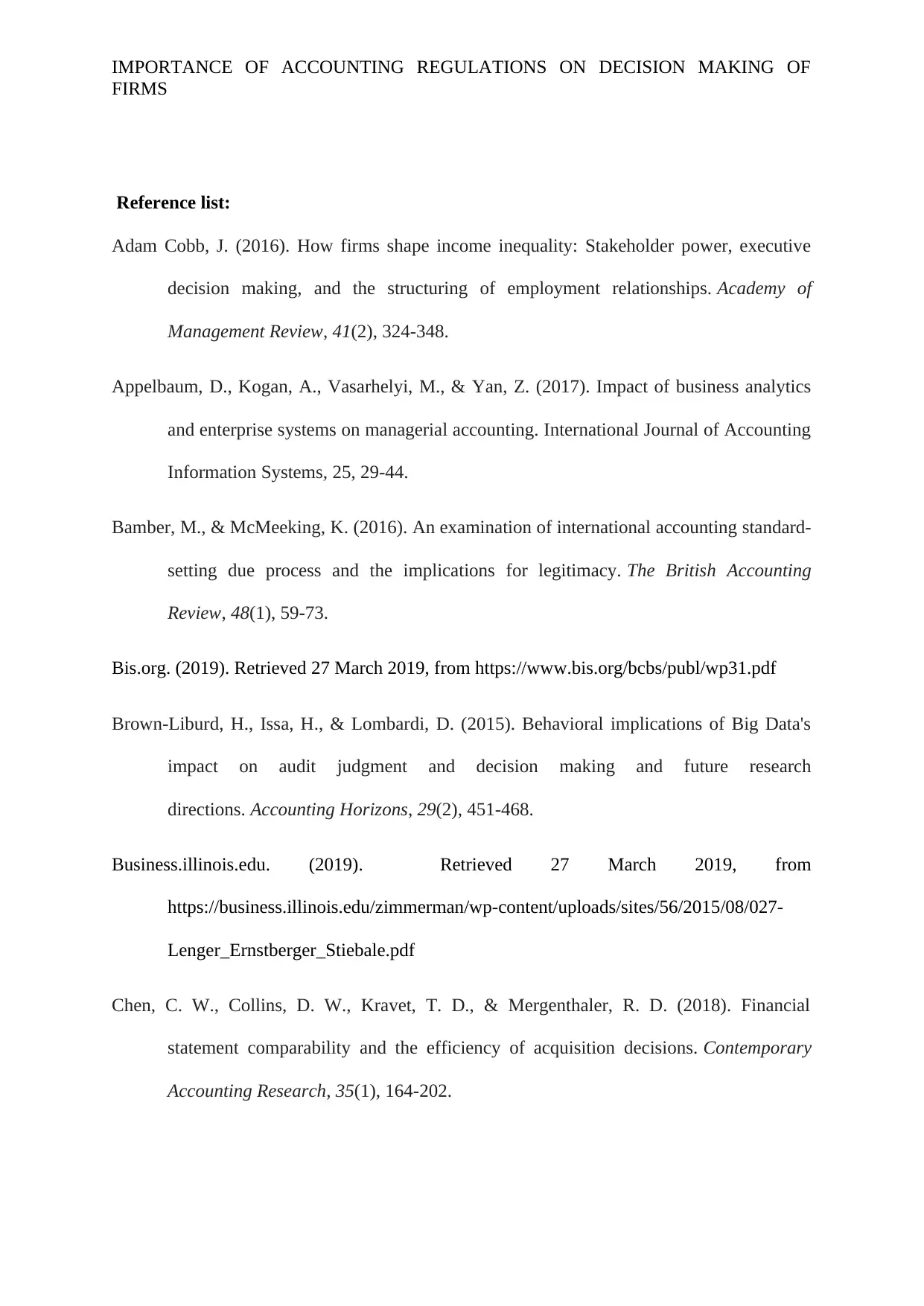
IMPORTANCE OF ACCOUNTING REGULATIONS ON DECISION MAKING OF
FIRMS
Reference list:
Adam Cobb, J. (2016). How firms shape income inequality: Stakeholder power, executive
decision making, and the structuring of employment relationships. Academy of
Management Review, 41(2), 324-348.
Appelbaum, D., Kogan, A., Vasarhelyi, M., & Yan, Z. (2017). Impact of business analytics
and enterprise systems on managerial accounting. International Journal of Accounting
Information Systems, 25, 29-44.
Bamber, M., & McMeeking, K. (2016). An examination of international accounting standard-
setting due process and the implications for legitimacy. The British Accounting
Review, 48(1), 59-73.
Bis.org. (2019). Retrieved 27 March 2019, from https://www.bis.org/bcbs/publ/wp31.pdf
Brown-Liburd, H., Issa, H., & Lombardi, D. (2015). Behavioral implications of Big Data's
impact on audit judgment and decision making and future research
directions. Accounting Horizons, 29(2), 451-468.
Business.illinois.edu. (2019). Retrieved 27 March 2019, from
https://business.illinois.edu/zimmerman/wp-content/uploads/sites/56/2015/08/027-
Lenger_Ernstberger_Stiebale.pdf
Chen, C. W., Collins, D. W., Kravet, T. D., & Mergenthaler, R. D. (2018). Financial
statement comparability and the efficiency of acquisition decisions. Contemporary
Accounting Research, 35(1), 164-202.
FIRMS
Reference list:
Adam Cobb, J. (2016). How firms shape income inequality: Stakeholder power, executive
decision making, and the structuring of employment relationships. Academy of
Management Review, 41(2), 324-348.
Appelbaum, D., Kogan, A., Vasarhelyi, M., & Yan, Z. (2017). Impact of business analytics
and enterprise systems on managerial accounting. International Journal of Accounting
Information Systems, 25, 29-44.
Bamber, M., & McMeeking, K. (2016). An examination of international accounting standard-
setting due process and the implications for legitimacy. The British Accounting
Review, 48(1), 59-73.
Bis.org. (2019). Retrieved 27 March 2019, from https://www.bis.org/bcbs/publ/wp31.pdf
Brown-Liburd, H., Issa, H., & Lombardi, D. (2015). Behavioral implications of Big Data's
impact on audit judgment and decision making and future research
directions. Accounting Horizons, 29(2), 451-468.
Business.illinois.edu. (2019). Retrieved 27 March 2019, from
https://business.illinois.edu/zimmerman/wp-content/uploads/sites/56/2015/08/027-
Lenger_Ernstberger_Stiebale.pdf
Chen, C. W., Collins, D. W., Kravet, T. D., & Mergenthaler, R. D. (2018). Financial
statement comparability and the efficiency of acquisition decisions. Contemporary
Accounting Research, 35(1), 164-202.
⊘ This is a preview!⊘
Do you want full access?
Subscribe today to unlock all pages.

Trusted by 1+ million students worldwide
1 out of 15
Related Documents
Your All-in-One AI-Powered Toolkit for Academic Success.
+13062052269
info@desklib.com
Available 24*7 on WhatsApp / Email
![[object Object]](/_next/static/media/star-bottom.7253800d.svg)
Unlock your academic potential
Copyright © 2020–2025 A2Z Services. All Rights Reserved. Developed and managed by ZUCOL.




